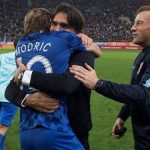Zlatko Dalić attended the International Conference on Performance Analysis in Sport on Friday in Opatija.
Croatia national football team coach Zlatko Dalić spoke at a roundtable for the International Conference on Performance Analysis in Opatija, saying the emotions after winning second place at the World Cup have not yet subsided and the pressure is greater than ever, though his goal remains the same, reports 24 Sata on September 21, 2018.
Zlatko Dalić participated in the roundtable with the U21 Croatia national team coach Nenad Gračan, the Slovenia coach Tomaž Kavčič and the U21 Slovenian national team coach Primož Gliha. Together, the coaches discussed the current status of their teams, how they prepare for competitions, and the challenges in choosing players and perspectives.
Answering a question about preparations for the Croatia national team for the World Cup, Dalić replied that one of the most important decisions, based on conversations with players and former coaches, was to prepare only those players who would go to the tournament.
“Before we leave for tournaments, we dismiss players who will not be playing, and this question would be in the foreground before the start of the competition. This is how all the players can devote themselves to the training without the burden and the nervousness of being chosen in the end,” said Dalić.
The Croatia coach emphasized that he wanted to create a community of players or a group that has their own goal, adding that they did not need to learn how to play football, since they play for major clubs.
“The players are allowed to regenerate after matches as they do in their clubs and there was no equivalent procedure for all,” said Dalić, who stressed the importance of analyzing the opponent, adding that this is where Croatia made a mistake at the World Cup. Namely, Croatia was unaware of the Danish player in the round of 16 who could throw the ball into the box from the sidelines.
Talking about the national team’s plans in the future, Dalić said his priority is the qualification cycle for the next European Championship and creating a new team of young players meant to replace the deserving teammates that have departed.
“The match against Spain where Croatia experienced a heavy defeat did not distort my plans even by a millimeter, because one cannot evaluate and create attitudes according to one game. It is important that in March next year we have 22 players and goalkeepers in the team that we can count on,” the coach highlighted.
Asked about cooperation with the U21 national team coach Nenad Gračan, Dalić said it was flawless.
“Some players are needed more in a younger team than in the A selection for now. Such a case is with Nikola Vlašić, who played well in one game, but needs continuity to enter the A team,” Dalić said.
The Croatia coach also stated that it is not good for young players to go abroad at age 18 because their success proved to be very rare.
“They are not mature either as a person or as a player, and a good example for this statement is Luka Modrić, who matured after 25 years of football, went abroad and achieved enormous success,” Dalić said, and also pointed out that the Croatian league has too many foreign players and that this should be regulated by a number limitation.
“This makes the development of Croatian young players more difficult. I have nothing against foreign players, but they have to have more quality and be better than the team they are coming to,” he said.
Dalić stated that a struggle in compiling his team was finding the right strikers. After Mandžukić’s departure, it has been difficult to find a similar player, because he also played a tremendous role in the defense.
He recalled the readiness to talk about the possible return of Nikola Kalinić to the national team, but also emphasized that the ball was in Kalinić’s court, not his. Dalić even blamed the public media for launching negative campaigns against players after they play poorly, which creates a bad atmosphere inside and outside of the team. The coach illustrated this using an example of Ivan Strinić and Josip Pivarić, who he said both played very well in the same left-back position at the World Cup.
The International Conference on Performance Analysis in Sport brought together the most successful international experts in the field of sports, including scientists, kinesiologists and successful domestic and foreign sports coaches who, during the three-day conference, presented the latest knowledge in the analysis of sports techniques and tactics, the analysis of elite athletes and teams, the analysis of sports performances and the performance analysis in young athletes.








